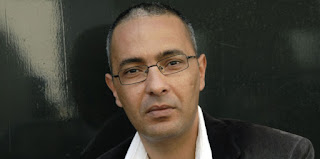What
do you think of atheism? Many people who
turn away from religion preach this idea that we do not need a god. If we understand the world and grasp our
power of intelligence and reasoning we can establish fair societies and a moral
code for everyone on this earth.
Traditions and religions will just define our ancestry and our
past. Basically there could be a Jewish
atheist or a Muslim atheist. I find this
idea is worth exploring.
In
my wondering thoughts about religion and science I found the book "God is not Great. How
Religion Poisons Everything." by Christopher Hitchens.
He
was a journalist that spent most of his time talking to people in war
zones trying to explore the possibilities to negotiate peace. In this
book he preaches atheism by bringing much evidence that all scripture is based
on mythology. Hitchens explores all different religions and stresses the element
of mythology in all of them. Not only in the monotheistic religions, but
also in Eastern religions and various cult worships. He goes so far as tracing customs like
circumcision Virgin births and sacrificing children to gods to old mythologies of early men.
He believes in the power of the telescope and
the microscope and he uses scientific findings of the past 500 years to show
that we can strive to life without wars. But people would have to be able to
think freely and critically.
If you think mythologies belong to the past just
check the excitement in the reception for the new Star Wars movie
trailer. Some internet websites crashed! I heard from many young
people that this creation of George Lucas is a modern day mythology. My
son had to enlighten me that this story was absolutely meant to be told as a
mythology. The heroes, their struggles and triumphs, the super natural effects and most importantly
the sequels! There is immense
anticipation to the fate of Luke Skywalker, Darth Vader, Princess Leia and the
others…

What is the importance of myths in human
life? I do not have an answer.
I do
not believe that religions are all bad.
I can see that the rituals and traditions of religion are essential for
many people. If we want to strive to a
new world without wars, I think it is essential to have an interfaith
dialogue. I have already spoken of the
church purchased by Muslims and turned into a community center. Young people need places to meet socially and
engage with others. These meeting places
should have clubs with activities such as chess, literature, poetry, dancing,
science, astronomy, hiking or fishing.
There are so many common areas of interest for youth. This is the best way to bring people together
and use their collective intelligence.
In the
conclusion to his book Hitchens talks about the need for a new Enlightenment. I agree with his vision:
This new Enlightenment will not need
to depend, like its predecessors, on the heroic breakthroughs of a few gifted
and exceptionally courageous people. It
is within the compass of the average person. The pursuit of unfettered
scientific inquiry, and the availability of new findings to masses of people by
easy electronic means, will revolutionize our concepts of research and
development. Much of this new research, for
the first time in our history, is within the reach if not the grasp of
everyone.
However, only the most naïve utopian
can believe that this new humane civilization will develop, like some dream of
“progress,” in a straight line. There
are bound to be struggles and setbacks along the way.
I know this from my various biological studies. It is a daily search for the truth. The scientist starts with ten ideas but after
five years of work only one of them will be correct.
I believe this progress will be more
linear if more and more children around the world will be educated and trained
to think freely and pursue knowledge.


























